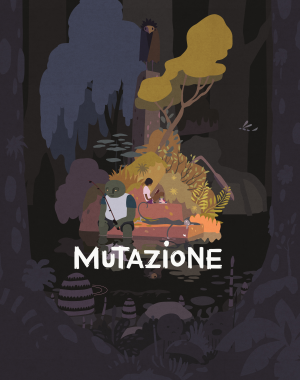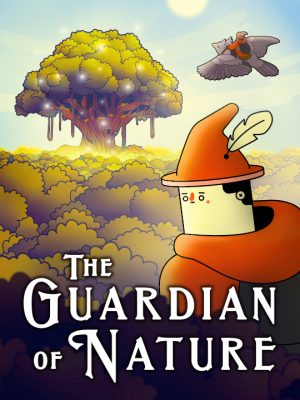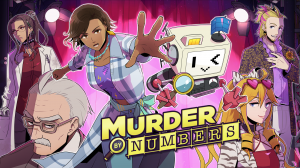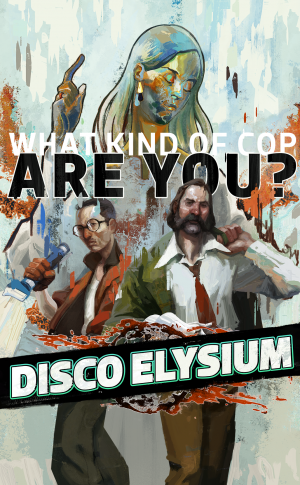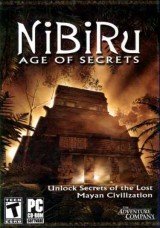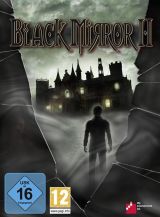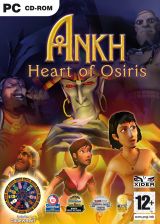Review for Mutazione
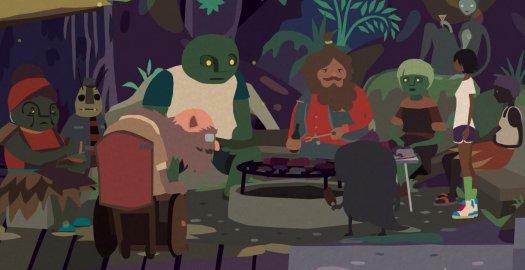
In Mutazione, conversation is the essence of everything…along with a little gardening. As a stranger among a close-knit community on a mysterious, secluded island, the only way to progress is by engaging with the local residents and watching as their cozy world unfolds and evolves around them. The whole experience almost feels like staying over at a distant relative’s place, trying out their cooking, idly hanging out, witnessing the mundane routine of these characters as they go about their daily business, and sometimes even catching a glimpse of their vulnerabilities. There isn’t a whole lot for you to actually do, but the way this beautifully animated and richly scored narrative adventure is written creates a sense of intimacy between you and each of the diverse locals that makes you feel like you’re slowly becoming a part of this big, quirky family.
You play as Kai, a teenager from the city who’s visiting her ailing grandfather, Nonno, on the small eponymous island. It’s inhabited by survivors of a natural disaster many years ago, who have since gone through their own unique mutations (hence the title). There’s a mysterious cat-like lady who happens to be the vocalist of the local (and only) band; a gentle librarian with long hair growing all over his body; and even a curious cave-dwelling, jello-esque creature whose intelligence seems to have grown beyond its physical capabilities. Although everyone on the island is unknown to Kai at first, her visit seems to be a total delight for some that remember her family from many years ago.
While Nonno is bedridden, Kai goes around the island exploring, sometimes doing errands like gathering and planting seeds or visiting certain people at her grandpa’s request, among other things. The bulk of your time will be spent guiding the teen around as she gets to know everybody: listen to their stories, help them out, participate in their activities, become whatever the islanders might need her to be, until each day passes to the next. The current time of day is displayed on screen, and it only advances according to your progress, so there’s no need to rush. If you see a transition that moves the story forward, it means Kai’s done all that is possible in that time frame. At night, when Kai chooses to go to sleep, it will trigger the arrival of the next day.
Every day Kai writes in her journal, which serves as a checklist of tasks to clear, though not all of them are mandatory. If you miss an activity or an event on a given day, that particular entry will simply be crossed out, but it will deprive you of a bit more insight into the related character’s story. That’s because the real value of the journal is that its entries are written to reflect Kai’s inner thoughts, sharing her impressions of the different characters, along with all her own personal musings and worries as a teenager. If you check back again after completing each task, Kai will have updated her initial thoughts with a different-colored ink.
Along with the journal, you’ll also have access to Kai’s backpack, her seed collection, a map of the village, and an encyclopaedia of the native flora. Most of your inventory is just there to add story flavor. When you obtain an item it goes into your backpack, but you can’t do anything with it except for reading its clever description. If there is something you need to deliver to a certain NPC, then all you need to do is find the person and converse with them, and the object will be handed off automatically when the time is right. This simplicity encourages players to focus more on meeting and talking to the other characters than fiddling inside their inventory.
Navigating around the island is also relatively straightforward, with a few different options. You can move Kai using the keyboard’s arrow keys, a controller’s thumbstick, or just click anywhere you wish for her to go with the mouse. I found the direct control methods to be more frustrating, as Kai seems to move ever so slowly that way. She doesn’t move any faster with the mouse, but it’s far less cumbersome to simply click and wait for her to arrive at the appointed spot. When Kai is close to an active object or NPC, or if your mouse pointer is hovered over one, different icons will appear to show what can be done with them. As well as the usual examine, pick up, and chat options, the clock icon marks an event that will commence when you click it.
During dialogue, sometimes Kai will get to choose a reaction from two provided options. The easiest example is whether to pick between responding seriously and lightening things up with a joke, but sometimes it’s more subtle, like when Kai is confused or if she’s not sure what to say about a certain topic. Occasionally there’s even an option for her to simply stay quiet. Either way, while the feedback I got may have differed according to my choices, they would all eventually lead to the plot’s intended course of action. Rather than finding this limiting, however, it freed me to choose what I actually wanted instead of worrying about the consequences.
Outside of conversation, the most important aspect of Mutazione is its gardening feature. Although it is tied in with the plot (meaning, you can only plant in certain areas and only after reaching particular points of the story), players have the freedom to cultivate their gardens with the seeds collected from all across the island. Grandpa Nonno will ask Kai to gather some seeds and plant them, at first on his humble rooftop garden, but eventually Kai will discover more plots of land scattered around where she can do her own planting.
These are no ordinary plants, though. Each plant is associated with a sound and produces said sound, like Acoustic Guitar for the Elephant Palm, Bassoon for the Hobble Berry, or something as vague as Bounces, Cascades, or Phantoms (which indeed sounds like an eerie synthwave). Once planted, they will start emanating their signature melody – it’s a little bit like having an orchestra in your garden.
For the plants to grow, Kai also has to play them some music called Growth Songs using her grandpa’s old drum. All plants have a preferred style, such as Wanderlust, Spooky, Harsh, or Euphoria, etc. When you’ve planted enough seeds with matching themes (for example, the note on the Beach Garden says that it needs ‘more mature Harsh plants’), a message will appear, confirming that you’ve composed said theme. If you change or remove the type of plants in that garden, however, you can lose the composition. You can still listen to the individual sounds the plants produce, though, and the garden actually works like a simple music-mixing tool, which is pretty cool.
All this takes place in-game, but in the latest Mutazione update there is a new side game dedicated just to gardening available from the main menu. There you can set the mood of your garden, share your seeds with your friends, and listen to the music your plants make.
As Kai explores more of the island, you’ll see hints of civilization from long ago: a broken car, a highway that goes nowhere, long-abandoned buildings now teeming with all kinds of strange, otherworldly life forms. Those who remain of that former society seem to have made the best of what their new nature has to offer, working and cooking with all sorts of local herbs and plants that went through similar mutations, just like them.
Sometimes Kai will run through the forest and a strange-looking lizard might scurry away, or as she makes her way towards the beach she might startle a flock of chickens and one of them will hop away frantically. These small environmental animations add another layer of depth to an already interesting island, making your walks or a jog down the pier a little less lonely and a lot more enjoyable. Everywhere you go, there are eye-catching landmarks on every corner: a floating market, the pub, and a garden below the restaurant, to name just some of the beautiful locations you can discover throughout the island.
What’s subtly impressive about the visual design is its use of shapes and palette to bring this lush landscape and its tiny details to life. At first glance, the way the graphics are presented seems to be fairly simple, with flat colors and basic textures. Kai doesn’t even have any facial features, although everyone else does, but she’s always immediately visible with her bright white t-shirt, purple shorts and green socks, one pulled higher than the other. But every single visual element in a particular area has been designed to show off greater depth and focus, however vivid and vibrant or muted and mysterious the location is meant to feel, like a character being illuminated by the light coming from the TV in an otherwise dimly lit room with desaturated colors.
While unfortunately there’s no voice acting in Mutazione, otherwise the sound design is the underlying soul of the game. It’s so subtle, but I loved how the island’s ambient outdoor sounds fade away when you step inside, and how you’re greeted once again by birds chirping and insects buzzing as soon as you go back outside again. Even the interface effects are quite satisfying: papers rustling as I flipped through the pages in Kai’s journal; the clicky sound heard whenever an item is obtained or an icon is clicked; even the subtle tune that marks a transition between scenes or areas. Sometimes the music will be muffled as you switch areas and get farther away from its source, which makes navigating through the many locations feel a lot more realistic.
When music is playing, there’s a hell of a beautiful tracklist. Some of the suites have reggae-inspired beats, with soft percussions and strings, while others are filled with haunting vocals and synths. At times they combine into this eerie ritualistic atmosphere, with ghostly whispers and chants, but then transition back into the more relaxing lo-fi beats that set the mood for the rest of the adventure. On certain occasions the sound of heartbeats or low vibration noises are played, which gave me chills when I first heard them. There are even songs sung by the characters themselves, from unintelligible Simlish-style folk songs to a set of rock tunes whenever the local band plays in the pub. As a whole, these pieces make for an eclectic soundtrack that perfectly captures the spiritual flavors of Mutazione.
While the plot itself is pretty linear, the real joy here is of course the time spent gleaning additional bits of information and hearing new stories when talking to the characters. It’s in choosing what you think is the best answer, or meeting the right person at the right moment that you can gain more insight into this unusual community. The gardening helps move things along, but the overall experience is largely anchored by its interpersonal encounters: awkward conversations, comforting words, late night confessions, and the uncertainties of a young teenager still trying to find her way.
There are no conventional puzzles to solve here. Instead, playing this game is like guiding an interactive movie along. I was always eager to find out what would be next, to hear more about what happened, to learn all the names I wasn’t familiar with and the story behind them. This could easily have come off as an on-rails experience where all you need to do is click and read for nearly ten hours, but there is enough freedom and player agency that I was made to feel very involved throughout. And though I won’t spoil anything, what I will say is that whenever the time is right, the characters tend to let Kai know that what she’s doing matters, offering her their gratitude and proper validation, which makes for a heart-warming experience.
The adventure is tied up with a rewarding conclusion in the end. Everything I’d been questioning throughout the game was answered, and left me feeling so glad about all the characters I’d embraced and the impact I’d had on the community. Although you begin as an outsider, this is ultimately a story about family, about facing your demons, and above all I believe it’s a tale of forgiveness. It’s one of those experiences that you come out of feeling hopeful, as sentimental as that may sound, and who couldn’t use a little (or a lot!) of that right about now? With its musical gardening, diverse characters, authentic dialogue, inspired soundtrack and gorgeous environments to explore, Mutazione offers not just an escape, but a reflection of what togetherness and community can accomplish in the face of tragedy.
WHERE CAN I DOWNLOAD Mutazione
Mutazione is available at:
- GOG
- Itch.io -60%
- Epic Games
- HumbleBundle
Our Verdict:
Mutazione is a feel-good narrative adventure that will remind you of the importance of love and family, though with minimal gameplay to master, the experience will appeal mainly to those looking for a poignant, character-driven story.


